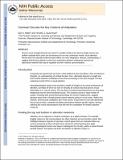Cortical circuits for the control of attention
Author(s)
Miller, Earl K.; Buschman, Timothy J.
DownloadMiller_Cortical circuits.pdf (1.149Mb)
PUBLISHER_CC
Publisher with Creative Commons License
Creative Commons Attribution
Terms of use
Metadata
Show full item recordAbstract
How are some thoughts favored over others? A wealth of data at the level of single neurons has yielded candidate brain areas and mechanisms for our best-understood model: visual attention. Recent work has naturally evolved toward efforts at a more integrative, network, understanding. It suggests that focusing attention arises from interactions between widespread cortical and subcortical networks that may be regulated via their rhythmic synchronization.
Date issued
2012-12Department
Massachusetts Institute of Technology. Department of Brain and Cognitive Sciences; Picower Institute for Learning and MemoryJournal
Current Opinion in Neurobiology
Publisher
Elsevier
Citation
Miller, Earl K, and Timothy J Buschman. “Cortical Circuits for the Control of Attention.” Current Opinion in Neurobiology 23, no. 2 (April 2013): 216–222.
Version: Author's final manuscript
ISSN
09594388